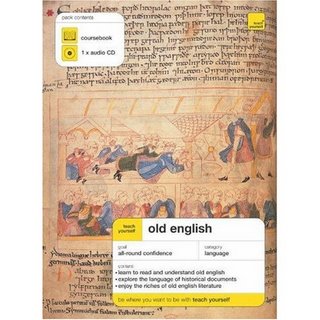 They say if you speak three languages you're trilingual, two languages, bilingual, and one language, English. Languages appear to be a problem in schools in England. With fewer and fewer students taking a modern language, and with the structure of 'English' teaching changing so rapidly, these issues directly impact upon the preparation of students when they arrive at university. The problem is that at school everything is neatly divided up into subjects. Someone thinks they'll do English, not having much of an interest in modern languages, say, and sit in front of medieval texts for the first time. They are shocked to discover that what they are looking at is not just 'English', but texts that are deeply influenced by Latin, and/or French, all mixed in with Anglo-Saxon. Literature in the middle ages was not monolingual and approaching it that way will not work. So when students sit down with Mitchell and Robinson's A Guide to Old English, it is increasingly the case that they don't know what they're looking at. The kind of students they had in mind when writing this book were so vastly differently-prepared than students today. Not more or less prepared, just different. Undoubtedly there is less systematic teaching of grammar; I heard a graduate student the other day ask what an inflected language was. Somebody who wants to know what an inflected language is should not start with Mitchell and Robinson. They need to start somewhere else and only then move on to M/R (still the textbook used for the Oxford syllabus). The perfect starting point is Mark Atherton's new Teach Yourself Old English. It is aimed at someone who has not studied OE before, but who would like to get to read texts as soon as possible. So it does not start with lists of paradigms or inflections. It starts you reading straight way, shows you how firmly rooted the words you use every day are in the Old English language, and gets you enjoying it from the start. It's a serious book but not at all stuffy. The Teach Yourself series is excellent by the way, and the Teach Yourself Sanskrit is the one used here in Oxford, so let the snobs be silent. The book comes with a CD in which you can hear all of the texts being recited and repeated and hugely helps the way you learn your verbs and vocabulary.
They say if you speak three languages you're trilingual, two languages, bilingual, and one language, English. Languages appear to be a problem in schools in England. With fewer and fewer students taking a modern language, and with the structure of 'English' teaching changing so rapidly, these issues directly impact upon the preparation of students when they arrive at university. The problem is that at school everything is neatly divided up into subjects. Someone thinks they'll do English, not having much of an interest in modern languages, say, and sit in front of medieval texts for the first time. They are shocked to discover that what they are looking at is not just 'English', but texts that are deeply influenced by Latin, and/or French, all mixed in with Anglo-Saxon. Literature in the middle ages was not monolingual and approaching it that way will not work. So when students sit down with Mitchell and Robinson's A Guide to Old English, it is increasingly the case that they don't know what they're looking at. The kind of students they had in mind when writing this book were so vastly differently-prepared than students today. Not more or less prepared, just different. Undoubtedly there is less systematic teaching of grammar; I heard a graduate student the other day ask what an inflected language was. Somebody who wants to know what an inflected language is should not start with Mitchell and Robinson. They need to start somewhere else and only then move on to M/R (still the textbook used for the Oxford syllabus). The perfect starting point is Mark Atherton's new Teach Yourself Old English. It is aimed at someone who has not studied OE before, but who would like to get to read texts as soon as possible. So it does not start with lists of paradigms or inflections. It starts you reading straight way, shows you how firmly rooted the words you use every day are in the Old English language, and gets you enjoying it from the start. It's a serious book but not at all stuffy. The Teach Yourself series is excellent by the way, and the Teach Yourself Sanskrit is the one used here in Oxford, so let the snobs be silent. The book comes with a CD in which you can hear all of the texts being recited and repeated and hugely helps the way you learn your verbs and vocabulary.It's an enormously useful textbook and I recommend it wholeheartedly.
5 comments:
Remember Mondadori?
Ok, that link doesn't seem to work. Just go to my blog...
Peter Baker's Introduction to Old English (Blackwell, 2003) also assumes no expertise in traditional grammar or other languages. It might prove a useful companion to Atherton's volume.
Yes I've seen Baker's book; he also has a website with OE Aerobics that are quite good. I prefer the TYOE volume to be honest because it is aimed at a more...mature reader. It assumes no knowledge but it doesn't simplify, if you know what I mean. I enjoy using it.
thanks for that, i've been trying to motivate myself to learn Old-English and my Mitchell & Robinson is almost incomprehensible to me.
Post a Comment